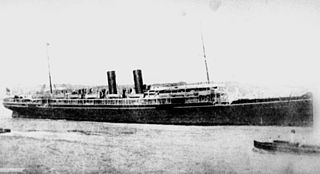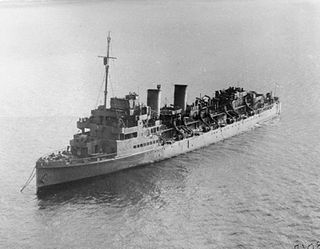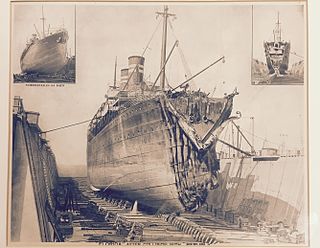
SS Ceramic was an ocean liner built in Belfast for White Star Line in 1912–13 and operated on the Liverpool – Australia route. Ceramic was the largest ship serving the route until P&O introduced RMS Mooltan in 1923.
The Wigham Richardson shipbuilding company was named after its founder, John Wigham Richardson (1837-1908), the son of Edward Richardson, a tanner from Newcastle upon Tyne, and Jane Wigham from Edinburgh.

The Lexington was a paddlewheel steamboat operating along the Northeastern coast of the United States from 1835 to 1840. Commissioned by Cornelius Vanderbilt, it was one of the fastest and most luxurious steamers in operation.

Sadko was a Soviet icebreaker known for its role in scientific expeditions in the Arctic. Built as SS Lintrose in 1913 for ferry service in Newfoundland, she was sold to the government of the Russian Empire in 1915 and renamed Sadko. In Russia, she was used as a freighter in the Arctic before sinking in 1916.

German submarine U-201 was a Type VIIC U-boat of the Kriegsmarine in World War II.
German submarine U-178 was a Type IXD2 U-boat of Nazi Germany's Kriegsmarine built for service during World War II.
SS Navemar was a cargo steamship that was built in England in 1921, was Norwegian-owned until 1927 and then Spanish-owned for the rest of her career. An Italian submarine sank her in the Strait of Gibraltar in 1942.

Bulgaria was a class 785/OL800 Russian river cruise ship which operated in the Volga-Don basin. On 10 July 2011, Bulgaria sank in the Kuybyshev Reservoir of the Volga River near Syukeyevo, Kamsko-Ustyinsky District, Tatarstan, Russia, with 201 passengers and crew aboard when sailing from the town of Bolgar to the regional capital, Kazan. The catastrophe led to 122 confirmed deaths.

SS (RMS) Douglas (III) – the third vessel in the line's history to bear the name – was a packet steamer which entered service with the London and South Western Railway in 1889 under the name Dora until she was purchased by the Isle of Man Steam Packet Company in 1901 for £13,500.

SS Egypt was a P&O ocean liner. She sank after a collision with Seine on 20 May 1922 in the Celtic Sea. 252 people were rescued from the 338 passengers and crew aboard at the time. A subsequent salvage operation recovered most of the cargo of gold and silver.

SS Oceana was a P&O passenger liner and cargo vessel, launched in 1887 by Harland and Wolff of Belfast and completed in 1888. Originally assigned to carry passengers and mail between London and Australia, she was later assigned to routes between London and British India. On 16 March 1912 the ship collided in the Strait of Dover with the Pisagua, a 2,850 GRT German-registered four-masted steel-hulled barque. As a result Oceana sank off Beachy Head on the East Sussex coast, with the loss of 17 lives.
SS Maasdam was a Dutch turbine steamship that was launched in 1920 and sunk in 1941. She was the third Holland America Line ship to be named after the village of Maasdam in South Holland.
SS Oslo was a British passenger ship that was torpedoed by the German submarine SM U-87 in the North Sea 15 nautical miles (28 km) east by north of the Out Skerries, Shetland Islands. She was travelling from Trondheim, Norway to Liverpool, United Kingdom while carrying passengers and a cargo of copper ore.

SS Fuso Maru was a Japanese ocean liner that was torpedoed by the United States Navy submarine USS Steelhead (SS-280) in the South China Sea 280 nautical miles (520 km) northwest of Cape Mayraira, Luzon, the Philippines, at, while she was travelling in Convoy MI-11 from Moji, Japan, to Miri, Borneo.

SS Prinses Astrid was a Belgian cross-Channel ferry struck a naval mine 3 nautical miles (5.6 km) off the coast of Dunkirk, France and sank with the loss of five of her 65 crew. All 60 survivors and 218 passengers on board were rescued by SS Cap Hatid (France) and various tugs from Dunkirk.
Mohawk was a passenger cargo steam turbine-powered ship built in 1925–1926 by Newport News Ship Building & Drydock Co. of Newport News for Clyde Steamship Company with intention of operating between New York and Jacksonville. She was luxuriously equipped, and regularly carried celebrity passengers. In 1929, her schedule was extended to Galveston, and she also operated winter cruises to various Caribbean destinations. On 24 January 1935, after leaving New York City on one of her regularly scheduled trips, she suffered a failure of her automatic steering gear and collided with Norwegian cargo ship Talisman. Mohawk sank after about an hour with a loss of 31 crew and 16 passengers.
SS El Kahira was a British Passenger/Cargo ship that sank during a storm in the English Channel on 9 July 1922 while she was travelling from London, United Kingdom to Algiers, Algeria while carrying a cargo of 1,310 tons of bagged sugar.
SS Toledo was an American Passenger/Cargo ship that sank during a storm in Lake Michigan near Port Washington, Wisconsin, United States on 24 October 1856 with the loss of 39 to 79 lives.

SS Florida was an Italian ocean liner, built in 1905 for Lloyd Italiano, which operated between Italy and both North and South America. In 1909 she collided with, and sank, White Star Line's Republic off the American coast. Later, as Cavour with Transatlantica Italiana, she was sunk by collision with the Italian auxiliary cruiser Caprera off the Spanish Mediterranean coast on 12 December 1917, without loss of life.










